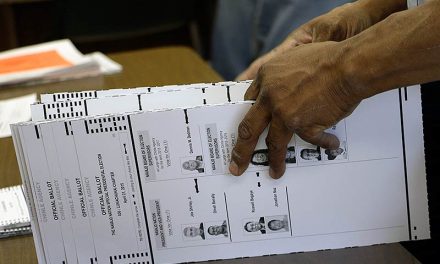
Thirty years later, feds give tribe chance to advocate for commissioner appointment
By Donovan Quintero
Special to the Times
WINDOW ROCK – After 30 years, the federal government has decided to hear tribal officials from the Navajo Nation and Hopi Tribe on why they should appoint a federal representative to the Office of Navajo and Hopi Indian Relocation.
Navajo Nation President Buu Nygren is set to meet with the White House soon to discuss the future of the Office of Navajo and Hopi Indian Relocation, or ONHIR.
To help him advocate the vacant position, which has been unoccupied since 1994, the Navajo Nation Washington Office is reaching out to relocatees who could share their stories that Nygren can share with federal officials.
ONHIR is an independent federal agency that plays a role in managing the relocation of Navajo and Hopi peoples due to historical land partitioning by the U.S. government. Established under the Navajo-Hopi Land Settlement Act of 1974, ONHIR operates directly under the authority of the president and is overseen by both the U.S. Office of Management and Budget and Congress.
According to former 24th Navajo Nation Council Delegate Paul Begay’s 2020 legislation, ONHIR is set to conclude once the president determines that all relocation responsibilities have been fulfilled, ONHIR will be dissolved. However, the agency has faced challenges in leadership; the position of commissioner, appointed by the president, has remained vacant since 1994.
Bavasi announces ONHIR closure
Christopher J. Bavasi announced to the House Appropriation Committee in February 2016 that ONHIR would close at the end of fiscal 2018. Bavasi, the agency’s executive director and a member of the U.S. Senior Executive Service, acts under delegated legal authority.
Congress ordered the preparation and submission of a relocation plan that must, “take into account the adverse social, economic, cultural, and other impacts of relocation on persons involved in such relocation and be developed to avoid or minimize, to the extent possible, such impacts,” and “assure that housing and related community facilities and services, such as water, sewers, roads, schools, and health facilities, for such households shall be available at their relocation sites.”
Former Navajo Nation President Russell Begaye and the 24th Council responded with their opposition on why the agency should not close as recommended by Bavasi.
Amendments to the act in 1988, according to Begay’s legislation, removed the language requiring plan preparations because relocation plans were already developed, which Bavasi based his recommendations on.
The amendments of 1988 also authorized ONHIR to call upon a department or agency of the United States to assist in carrying out the relocation plan. The amendment further provides that, if any agency fails to provide reasonable assistance, ONHIR shall report such failure to Congress.
Unable to make finite plans
Five years before, in ONHIR’s 1983 report and plan update, the agency stated that it was still unable to make finite plans because of the non-availability of land selections. But it also stated its intention to “initiate coordination efforts to establish joint governmental agency involvement for future relocation to deal with such areas as employment, roads, utilities, and like areas of need.”
ONHIR is responsible for certifying eligibility for relocation, reviewing appeals, and providing housing for those affected by land partitioning. Additionally, the agency oversees the management of lands acquired under the act, which total 387,000 acres, including 352,000 acres referred to as the “New Lands” in Arizona. This land is now part of the Nahat’á Dziil Chapter of the Navajo Nation, with the U.S. holding legal title while the tribe maintains beneficial interest.
The agency’s function is not solely administrative; ONHIR actively engages with Navajo tribal members to address critical issues such as grazing rights, homesite leases, and rights of way on tribal land. As ONHIR continues its work, the completion of the relocation process remains a significant goal, impacting the lives of countless individuals within these communities.
ONHIR has never used its authority under the act to call upon federal agencies to implement the promises of the relocation act, never coordinated joint governmental agency involvement to ensure the U.S. fulfills the promises made in the relocation act and takes the position that it is not required to carry out the promises made to the Navajo Nation or follow through with the plans already created.
ONHIR Transition Team
In February 2016, then Navajo Nation President Russell Begaye created the ONHIR Transition Team which conducted nine public hearings and five public meetings.
Public comments were collected which indicated the lack of community infrastructure such as roads, power, water, community centers, utilities to relocate homes, economic development, sewage, and solid waste.
The Navajo-Hopi Land Commission passed resolution NHLCJN-4-19 stating the commission’s opposition to the closing of ONHIR.
Paul Begay cited in his legislation that it was in the Navajo Nation’s “best interest to oppose the closure of the Office of Navajo and Hopi Indian Relocation until all the duties are responsibilities are completed including all of the unfilled obligations to relocatees and impacted communities.”
Four years later, the Navajo Nation Washington Office has begun reaching out to Navajo relocatees to gather their stories that President Nygren could share with federal officials when he meets with them to advocate for a commissioner to be appointed.
Former Navajo Nation President Jonathan Nez, who is running for the U.S. Congressional District 2 seat, currently occupied by Republican Eli Crane, said on Monday night during a town hall meeting in Window Rock, that his administration felt it was important that ONHIR has a commissioner.
He said when he recommended a person, who he did not mention by name, to the White House, he got opposition internally from the Navajo Nation.
“But I thought, him being a second generation relocatee would be important to have someone that is from the area and that knows the system and but of course, at the end of the day, I got opposition from within,” said Nez.
True consultation could not take place
In a seven-page letter dated September 2022, the Nez-Lizer Administration stated why the Navajo Nation could not consult with ONHIR, as well as highlighted several discrepancies in the Office of the Inspector General’s report.
The letter stated that because the agency did not have a commissioner that is appointed by a U.S. president, true consultation could not take place.
“Just as a U.S. ambassador to a foreign nation is appointed by the president to be his representative in government-to-government consultations, the commissioner of the Office of Navajo and Hopi Indian Relocation is a presidential appointee with direct responsibility to the president for the implementation of the Navajo-Hopi Settlement Act of 1974,” Nez’s letter read.
The former president further stated in his letter that it was “unacceptable and impertinent to expect the Nation to consult with a federal civil servant who has simply delegated the Commissioner’s authorities.”
“Without the oversight of an appointed commissioner, ONHIR employees have been non-responsive to the principal concerns of the Nation and the relocated Navajo families,” Nez stated in his September 2022 letter.
Nez cited the Navajo Nation believed the agency consistently violated the due process rights of Navajo individuals applying for relocation benefits, failing to fulfill its legal obligation to effectively manage lands designated for the benefit of the Navajo people and had yet to deliver the infrastructure and development projects that Congress promised during hearings and outlined in the Relocation Act.
“An empowered commissioner can help bring some measure of justice and equity that has left a black mark on American history,” Nez stated.
Despite the letter addressing the tribe’s stance of a lack of an ONHIR Commissioner, one was never appointed during Nez’s and Begay’s tenures.
The Navajo Times reached out to Justin Ahasteen, the Navajo Nation Washington Office executive director, for a comment, but as of press time, he did not respond.
Collecting stories
However, according to the NNWO website, collecting stories from the public.
The Navajo Nation Washington Office invites those affected by the Navajo Partitioned Lands to share their story. NNWO will submit the stories to the United States Office of Navajo and Hopi Indian Relocation for use in advocating to the White House the urgent need to appoint a Commissioner to the Office of Navajo and Hopi Indian Relocation,” the NNWO website states. “While there are countless reports from the US Government Accountability Office and US Office of Inspector General outlining ONHIR’s deficiencies and failures in carrying out the relocation, those reports do not fully encapsulate the stories of those impacted by the Land Partitions.”
Anyone with questions regarding the request to share stories was directed to contact Marlena Forster-Mason with the NNWO at (202) 682-7390 or mforster@nnwo.org.








 Highway 264,
Highway 264, I-40, WB @ Winslow
I-40, WB @ Winslow